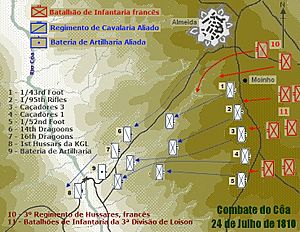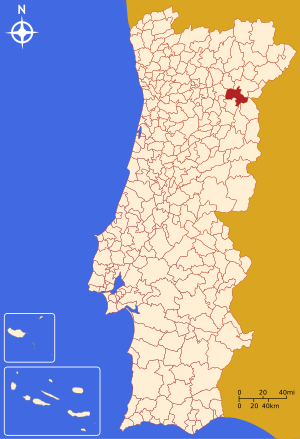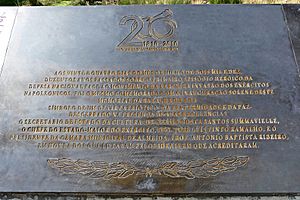Combat of the Côa facts for kids
Quick facts for kids Battle of the Côa Valley |
|||||||
|---|---|---|---|---|---|---|---|
| Part of the Peninsular War | |||||||
 Map containing the positions of the beginning of combat forces in the Coa and indication of movement of units. |
|||||||
|
|||||||
| Belligerents | |||||||
| Commanders and leaders | |||||||
| Strength | |||||||
| 20,000 (6,000 engaged) |
5,000 (4,000 engaged) 6 guns |
||||||
| Casualties and losses | |||||||
| 117 killed 210 wounded |
32-400 killed 182-700 wounded 29 missing 0-400 captured |
||||||
The Combat of the Côa was a battle that happened on July 24, 1810. It was part of the Peninsular War, which was a big conflict during the Napoleonic Wars. This fight took place in the valley of the Côa River in Portugal.
It was the first major battle for the French army led by Marshal André Masséna. His army had 65,000 soldiers. They were getting ready for their third invasion of Portugal.
The British and Portuguese forces were outnumbered. Their leader, General Arthur Wellesley, 1st Duke of Wellington, told Brigadier-General Robert Craufurd not to fight beyond the Côa River. But on July 24, Craufurd's Light Division, with about 5,000 soldiers, was surprised by 20,000 French troops.
Instead of retreating as ordered, Craufurd decided to fight. His troops barely avoided a complete disaster. The French wanted to push the Light Division back across the river. This would allow them to attack the nearby town of Almeida. The French succeeded in pushing them back after a tough fight. But then, the French tried to cross the river themselves. This attack cost them many soldiers.
Contents
Why the Battle Happened
The Peninsular War was a long conflict. It involved France, Spain, Portugal, and Britain. This battle was part of France's third attempt to invade Portugal. Before the Combat of the Côa, the French had been busy. They were building the Lines of Torres Vedras. They also fought in the Siege of Ciudad Rodrigo. These events set the stage for the fight at the Côa River.
The Battle of the Côa River
Who Fought: The Armies
The British and Portuguese forces were led by Major General Robert Craufurd. His troops were part of the Light Division. They had two brigades of infantry. These included famous units like the 43rd and 52nd Foot. They also had the 95th Rifles and Portuguese Caçadores (light infantry).
They were supported by a cavalry brigade. This included the 14th and 16th Light Dragoons. They also had the 1st King's German Legion Hussars. A small artillery unit, the Chestnut Troop, was also with them.
The French forces were part of Marshal Michel Ney's VI Corps. They had two large infantry divisions. These were led by Major Generals Julien Augustin Joseph Mermet and Louis Henri Loison. Their divisions included many different French regiments. They also had units like the Hanoverian Legion. The French also had cavalry brigades and artillery.
French Attack Begins
General Craufurd made a risky choice. He decided to fight with a river behind his troops. This river was too deep to cross easily. His forces were also greatly outnumbered.
On the morning of July 24, after heavy rain, Marshal Ney sent his troops forward. Two French divisions attacked the British and Portuguese. A small group of British soldiers from the 95th Rifles came under heavy fire. French soldiers then charged with bayonets. The outnumbered British had to retreat.
The guns from Almeida, a nearby town, even fired on the 95th Rifles by mistake. They thought the dark uniforms belonged to the French. French cavalry then attacked the British. But British troops from the 43rd Regiment arrived to help. They fought fiercely, and the French attack slowed down.
Even though Wellington had ordered him to retreat, Craufurd kept fighting. More French troops arrived and got ready for battle.
The Fight Continues
French cavalry tried to go around the British troops. Meanwhile, French infantry attacked the British near a windmill. The French charged with bayonets. The British and Portuguese began to fall back. They were getting separated from other British units. The French cavalry caused many casualties.
Craufurd soon realized his troops were in danger. The French were threatening the only escape route: a bridge over the Côa River. He ordered his troops to retreat across the bridge. The 52nd and 43rd Light Infantry and the 95th Rifles protected the retreat.
Things got worse for the British. A supply wagon overturned, blocking the bridge. The French were pushing hard against the units protecting the retreat. Craufurd ordered these troops to hold a position overlooking the bridge. They had to stay there until everyone else had crossed. The French took the high ground. But then, the British and Portuguese launched a surprise attack. They held off the French long enough for most of their army to cross the river.
French Try to Cross the River
After pushing the Light Division back, Marshal Ney tried to attack across the Côa River. In the first attempt, French grenadiers charged the bridge. They faced heavy gunfire and cannons. They could not get even halfway across.
A second, stronger attack was made by elite French light infantry. They charged the bridge with great bravery. They pushed forward until the bridge was blocked by dead and wounded soldiers. Many of them were killed or wounded in just a few minutes. A final attack by the French was also easily stopped.
What Happened Next
The battle ended with the French pushing the Light Division back. Craufurd's forces had been defeated and barely escaped. They retreated completely at midnight. This allowed Marshal Masséna to begin his siege of Almeida.
Some reports said the British Light Division held off 20,000 French troops. However, only about 6,000 French soldiers actually fought against 4,000 British and Portuguese.
It is hard to know the exact number of soldiers killed or wounded. Both sides gave numbers that favored themselves. French reports claimed the British and Portuguese lost 1,200 soldiers. British reports said they lost 36 killed, 189 wounded, and 83 missing. French casualties are easier to estimate. Both sides agreed that around 500 French soldiers were killed or wounded. Most of these losses happened during the French attacks across the bridge.
After the Battle
After the Combat of the Côa, the Third Portuguese campaign continued. The next major battle was the Battle of Bussaco.



